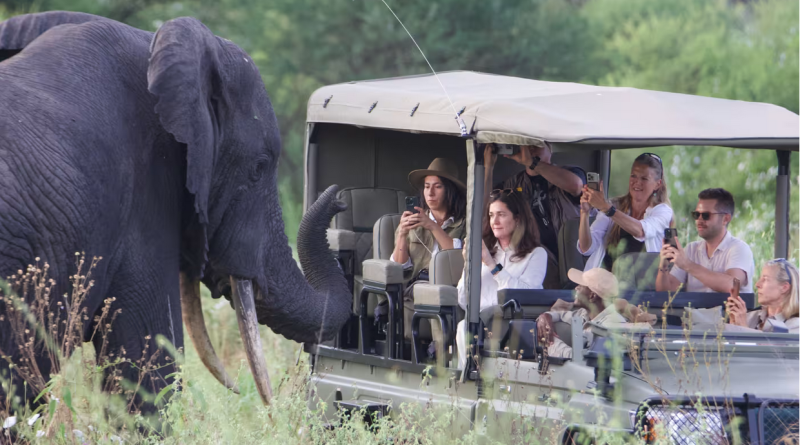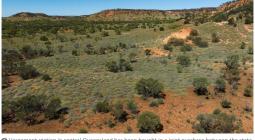From Swiss Banker to East Africa Conservationist, She Now Offers Others a Change of Pace

Cradling her pet mongoose in her arms, Fabia Bausch sits watching the Tanzanian sunset among guests enjoying her curated “slow safari” experience at Chem Chem Lodge. The aptly named “Mongoo” chirps in mild protest if Bausch quits scratching the creature’s chin for too long, but her owner needs to pull out a phone and call up a 10-year-old photo.
“This is what the land looked like before we leased it for Chem Chem,” Bausch says. “And, this is what the bush would look like if we didn’t work to manage the land concession.”
The grainy, washed-out shot reveals a portion of the East African plains devoid of vegetation. The tall grass of the savannah is picked and eaten away clean to the ground from a mix of migrating wildlife, cattle herds, and roaming goats that threaten to leave a dust bowl behind them.
It’s an alien image compared to the terrain surrounding this end-of-day fireside chat alongside Lake Manyara, Mdori. The flatlands now thrive with grasses, Candelabra Trees, and endless fields of Morning Glories folding up their blossoms for the night.
“In our world, to make this work, we have to deal with the poorest of the poor and the richest of the rich,” Bausch says. “I had to learn how to balance how we interacted with people just as we needed to learn how to balance resources to protect and conserve our concession.”
Co-founded by Bausch, a former Swiss banker, and her partner, Nicolas Negre, Chem Chem Safari owns and operates three camps: Chem Chem Lodge (opened in 2011), Little Chem Chem Safari Camp (2013), and Forest Chem Chem (2018). All three venues are located on the 50,000-acre Burunge Wildlife Management Area in Tanzania. Chem Chem Safari and its philanthropic arm, Chem Chem Association, were simultaneously founded in 2008.
By national law, the wild, open land of Tanzania belongs to the communities and the tribes native to the region around Chem Chem. Bausch and her team can only operate their business on a land concession leased from the government with the understanding they must assist in conservation and wildlife protection as part of their safari operation.
“Our guests come here very well-educated and already well aware of the conservation work we do,” Bausch says. “Many of them are already involved in their own fields of philanthropy—sometimes wildlife, sometimes medicine, sometimes art. Still, they come away with an experience for the need to protect and conserve.”
Even though guests often come to her already respectful of her team’s ongoing work, many visitors underestimate how much effort and resources go into what her team accomplishes, she says.
During a visit to the lodge or the field camp, guests enjoy comfortable bivouacs in areas where species ranging from zebras and Black Faced Monkeys to lions and hyenas are free to wander and approach. The protected animals are never restrained or hampered in the natural habitat the Chem Chem team agreed to protect as part of their lease. Nightly rates range from US$1,190 for a tent suite to US$4,375 at Chem Chem Lodge, and US$1,155 to US$4,040 at Little Chem Chem.
A mix of guided nature walks and photography rides aboard specially adapted Land Cruisers take guests out into the bush with experts skilled in spotting the variety of African wildlife.
Clever Zulu, Chem Chem executive manager, says revealing those species to the safari visitors is the key to making sure guests take the message of conservation back home—a message the Tanzanian government believes is essential inside its border and beyond.
“We had a lot of careful discussions with the government during the negotiations for the concession,” Zulu says. “When you lease a region of land, you take on the consequences of being its custodians. We want [Chem Chem] to serve as a model for future land consignments with other entities in Tanzania.”
In addition to managing the conservation efforts, Zulu also helps to coordinate with a multinational anti-poaching force. Armed government teams from Tanzania and Kenya cooperate and strategize, staying on alert against both individual poachers hunting for their own bush meat or organized teams illegally hunting for profit.
“We are in the process now of completing our anti-poaching station on the Chem Chem Property,” Zulu says. “We work to facilitate the government and help them to carry out their work in conservation and in the fight against poaching. We never want to shy away from that responsibility.”
Besides conserving the region’s animals, Chem Chem’s work also helps local tribes.
The overall land concession includes such tribes as the Maasai, the Datoga, and the more migratory Hadzabe, according to Tania Ocampo, the region’s sustainable development manager, tWhether focusing on education or trade, Ocampo and the guides make sure to respect and preserve the tribal identities while they add to their capabilities.
“The tribes are distinct,” Ocampo says. “For example, the Maasai were the dominant tribe for a long time. Meanwhile, the Datoga are pastoralists. They are one of the oldest tribes in Tanzania. Although welcoming in nature, they are still highly secretive—safeguarding their tribal identity amongst themselves from newcomers. But, they do trade with visitors and other tribes.”
She describes the Hadzabe as hunter-gatherers and a minority in Tanzania.
“They are facing extinction due to loss of habitat to other tribes,” Ocampo says. “Legendary Expeditions, a Chem Chen partner, provides access to land where they can continue their traditional lifestyle. Very few of them are interested in venturing outside of their scope. The majority deeply craves going back to nature and pursuing a livelihood based on simplicity, community, and freedom.”
Safari guests from around the world are able to visit and learn about these tribes first hand, breaking down cultural barriers and discovering the importance of preserving their communities. Such encounters are an essential element of what Bausch describes as her “slow safari” experience.
“I found traditional safari schedules were demanding for guests,” Bausch explains. “It felt as though there was a pressure by the organizers or guides—even with luxury safari experiences—to make the guests attend every nature walk or to join every drive. At Chem Chem, we allow for more flexibility so guests can encounter the environment, wildlife, and the people at a more restful pace.”
There was a time in her previous banking career when Bausch never would’ve imagined managing safari camps and overseeing a sprawling wildlife and cultural preservation efforts. She credits her employees for educating her.
“I work with a fantastic team here,” she says. “Working as a banker and learning how to read financial reports isn’t that different from running a hotel, but the special nature of Chem Chem required me to take a spiritual ownership of our important work here.”


